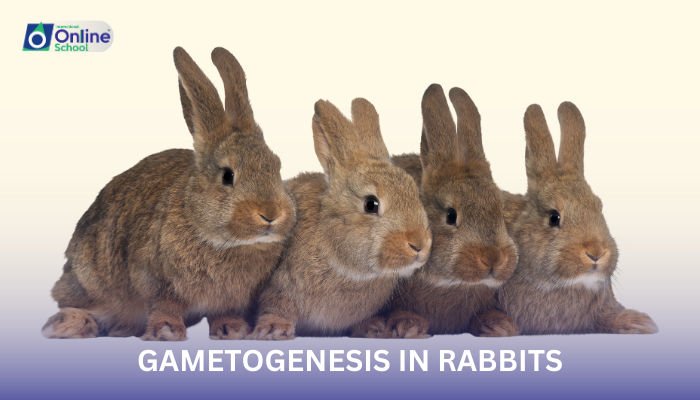
Learning Outcomes
i. Understand the process of gametogenesis in rabbits, focusing on the formation of sperm and eggs.
ii. Describe the hormonal control mechanisms involved in gametogenesis in rabbits.
iii. Recognize the significance of gametogenesis in the reproductive cycle of rabbits.
i. Gametogenesis in Rabbits
Spermatogenesis: The process of sperm production in rabbits occurs in the testes. It begins with spermatogonia (undifferentiated germ cells) undergoing mitotic divisions to produce primary spermatocytes, which then undergo meiosis to form haploid spermatids. These spermatids undergo further maturation to become spermatozoa.
Oogenesis: Egg production takes place in the ovaries. Oogonia (germ cells) multiply by mitosis and develop into primary oocytes. These cells begin the first meiotic division but are arrested in prophase I until puberty. Each month, some primary oocytes resume meiosis, but only one typically completes meiosis I and II to become a mature ovum.
ii. Hormonal Control in Gametogenesis
Spermatogenesis Hormones: The process is regulated by hormones such as Follicle-Stimulating Hormone (FSH) and Luteinizing Hormone (LH). Testosterone, produced in the testes, also plays a crucial role in the development and maintenance of sperm.
Oogenesis Hormones: In females, FSH stimulates the growth of ovarian follicles, and LH triggers ovulation (release of the mature egg). Estrogen and progesterone, produced by the ovaries, regulate the menstrual cycle and prepare the reproductive tract for potential pregnancy.
iii. Significance in the Reproductive Cycle
Genetic Diversity: Gametogenesis is crucial for producing genetic variation through meiosis, which is important for the health and adaptability of the species.
Reproductive Cycle Regulation: The interplay of hormones not only controls gametogenesis but also regulates the broader aspects of the reproductive cycle, such as sexual behavior, pregnancy, and lactation in rabbits.
In conclusion, gametogenesis in rabbits is a complex process that involves the coordinated production of sperm and eggs under tight hormonal control. Understanding these processes is essential in the fields of reproductive biology and veterinary medicine, especially for species like rabbits that are important as pets, in research, and in agriculture.